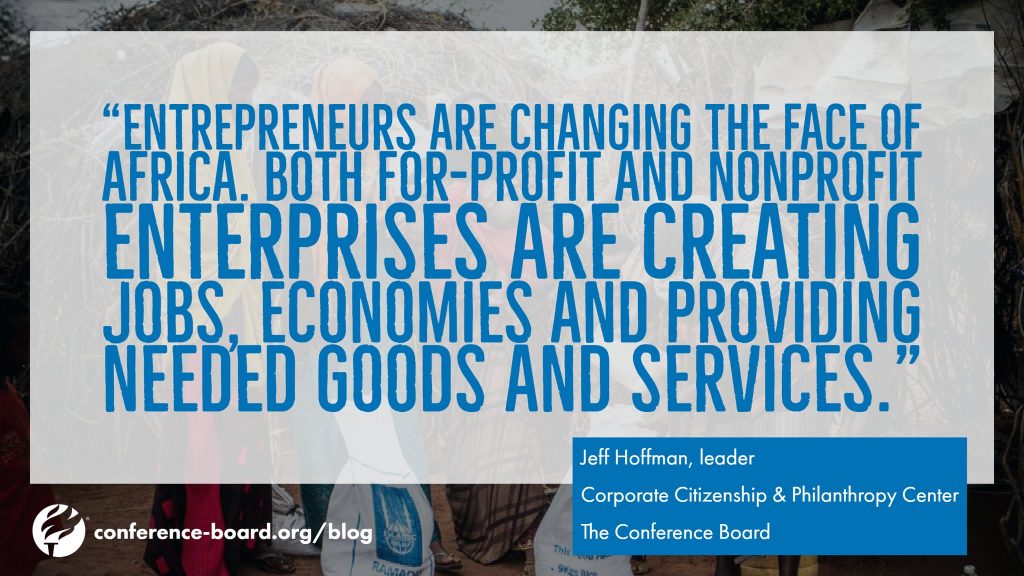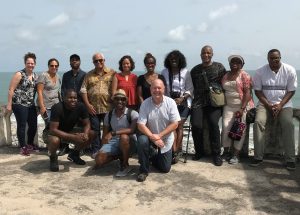 The United Nations (UN) estimates that by 2050, 23 percent of the world’s workforce population will originate from sub-Saharan Africa. At that time, the UN also notes, 40 percent of the world’s youth will be African. Despite the prevailing portraits of poverty and humanitarian need, Africa continues to be rich in natural resources and human capacity. Global economic development continues to rely strongly upon extractive opportunities across the African continent. Multinational corporate development has begun to demonstrate that investment within and across Africa will bring greater results for all concerned.
The United Nations (UN) estimates that by 2050, 23 percent of the world’s workforce population will originate from sub-Saharan Africa. At that time, the UN also notes, 40 percent of the world’s youth will be African. Despite the prevailing portraits of poverty and humanitarian need, Africa continues to be rich in natural resources and human capacity. Global economic development continues to rely strongly upon extractive opportunities across the African continent. Multinational corporate development has begun to demonstrate that investment within and across Africa will bring greater results for all concerned.
The Conference Board’s Global CSR and Philanthropy Council met in Accra, Ghana, in November to discuss corporate social responsibility in sub-Saharan Africa. During the three-day meeting we focused on:
- Africa’s presence in global development
- Disasters
- The economic, social and political landscape of Ghana
- Education
- Economic development
- Philanthropy
- Women’s issues.
The theme of “innovation and entrepreneurism” ran through much of the discussions. “Entrepreneurs are the new aid in Africa,” said Paul Payne, business transformation lead at the British Council in Ghana. “Entrepreneurs find a problem, create a solution. They are creating sustainable change versus short-term assistance.”
Entrepreneurism in Africa
Entrepreneurs are changing the face of Africa. Both for-profit and nonprofit enterprises are creating jobs, economies and providing needed goods and services. On a site visit to Impact Hub Accra we learned that if a new business in Ghana can get it right, it can enter the more complicated country of neighboring Nigeria and hopefully be successful. If they do succeed, they should be primed to enter other countries on the continent.
Africa has a story of innovation and progression. Ghana, being one of the most progressive countries on the continent, is a good place to illustrate this. Mobile technology is driving banking, health innovations, learning and even data sharing solutions to societal problems.
According to Worlali Senyo, Director of Growth, Research and Development at Farmerline Ltd, one-third of the world is fed by small-scale farmers in emerging markets and it’s for this reason that these smallholder farmers are the future of agriculture, but only if they increase production by 2050 to meet global demand. The good news is that farmers are transforming into successful entrepreneurs through information, services and access to global markets. Yet, 50 percent of farmers in Africa don’t have access to a savings account and only 12 percent have access to credit, although mobile banking, microloans and mobile ATMs are addressing this issue.
To help these farmers reach the demand, supply chains need to be optimized. MoringaConnect, which takes the moringa tree and turns it into beauty products from its seeds, has 2,500 smallholder farming families engaged. Their business model pays farmers over the poverty-level wage for their resources. MoringaConnect sets up farmers on land to let them create the farm, work it, pay off the investment as they go and eventually own it. The organization is an advocate for farmers to receive better value for what they cultivate.
“If they don’t build from the roots, nothing will be sustainable,” said Theo Sowa, CEO of the African Women’s Development Fund. “When people talk about African philanthropy, they talk about something being done ‘to’ Africa, not what is done internally.”
The context for philanthropy in Africa
This is the 21st Century. Things have changed, particularly in Africa with regard to traditions and how people make them work today. Strengthening philanthropy in the continent means keeping cultural values while also making the practice more practical, efficient, and effective. Pressing questions include how to grow the breadth of African philanthropy to change the narrative of a continent that the rest of the world has historically considered looking for handouts. And then, how do Africans amplify that change?
This is a different approach from trying to make African philanthropy fit in a British or American mold, but rather making African philanthropy work for Africa. Philanthropy is an engine responsible for part of the African entrepreneurial movement.
A continent of diverse nations
We often lump all African nations together, but it is no different from Asia or Europe. The continent’s countries are as different as China, Japan, India, and Indonesia are within Asia. There is no one Africa—it comprises 54 countries and a plethora of different local tribal languages, as well as western languages. It is composed of different forms of government and economies, not to mention topography.
African people are very diverse: they’re rural and urban; they’re educated and uneducated; they have different cultures and socio-economic statuses; and there are large communities of disabled and LGBT communities, just to name a few aspects of their diversity.
 The members of the Global CSR Council traveled to Elmina, where we experienced together the emotional, thought-provoking, and horrific story of Elmina Castle. The site is preserved as a Ghanaian national museum and the monument was designated as a World Heritage Monument under UNESCO in 1979. First established as a trade settlement, the castle later became one of the most important stops on the route of the Atlantic slave trade.
The members of the Global CSR Council traveled to Elmina, where we experienced together the emotional, thought-provoking, and horrific story of Elmina Castle. The site is preserved as a Ghanaian national museum and the monument was designated as a World Heritage Monument under UNESCO in 1979. First established as a trade settlement, the castle later became one of the most important stops on the route of the Atlantic slave trade.
Our Council Chair, Dr. Jacob Gayle, President of the Medtronic Foundation, said of our trip: “Some felt trepidation and excitement of coming to sub-Saharan Africa. We had many highlights that we experienced together as a council., including exposure to the many people we encountered who brought diversity of background, culture, language and experiences. I feel optimism for the future based on the youth we met. We learned, we shared and go away inspired!”
While much good is done by local charities and global aid organizations, entrepreneurs are increasing opportunity and lifting people out of poverty from the inside out. Africa is a continent on the move!
Article first published by The Conference Board on December 6, 2017. www.conference-board.org/EntrepreneursNewAidAfrica
